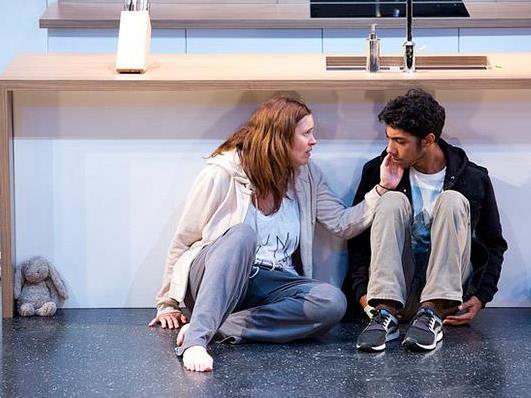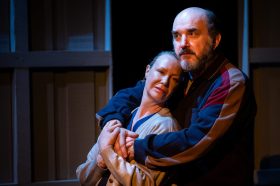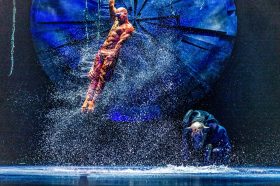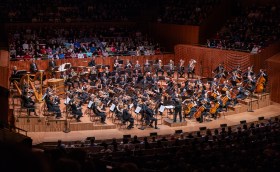Image: belvoir.com.au
In a modern upper class Australian home, Elektra wages a juvenile rebellion against her mother Klytemnestra and stepfather Aegisthus for the murder of her father. Her long-suffering sister Khrysothemis plays the role of the dutiful good daughter whilst having an affair with her stepfather, and absentee brother Orestes still manages to dominate the discourse in the household. Unbeknown to the others, Elektra has manipulated Orestes into a plan to avenge their father by murdering their mother and stepfather.
Does Belvoir’s latest rehashing of Greek tragedy sound a little soap-operatic? It’s almost to be expected – when you take out themes of the corruption of the controlling class and the fate of humankind that characterises Greek tragedy, the disputes of a suburban family seem just a bit… petty. You’d assume that the purpose of transposing Greek tragedy into the modern world is to make it relatable, but it’s hard to relate to any of these characters. They are rife with inconsistencies, and transposed to modern society in the most clichéd of ways.
The action takes place over the course of a day across two rooms, the dining room and the kitchen, with the characters migrating between both spaces. The set is constructed so that in the first act we see only the events taking place in the dining room. At the midway point, the stage revolves 180 degrees to reveal the kitchen and the events of the day are played out again, revealing the obscured moments of the day. It’s a novel idea that has been well executed, but feels a little gimmicky as it fails to tie into the themes of the story. There is repeated reference to the duality between Elektra and her mother being two sides of the same coin, yet the staging (and title) suggests instead a duality between Elektra and Orestes, which fails to come into fruition.
Structurally it is quite sophisticated. The first act serves as exposition. Characters and conflict are established without giving too much away, ending on a cliffhanger. In the second act, the skeletons come out of the closet as the characters play out their inevitable gruesome fate. Writing this structure is not an easy task, and writers Jada Alberts and Anne-Louise Sarks have done an elegant job of it. It’s in the characterisations that the writing falls short. Katherine Tonkin as Elektra is an aggressive, antagonistic bully. Performance wise, Tonkin’s physicality is quite engaging – it’s the characterisation itself which is inauthentic. Elektra is more like a typical rebellious teen than the traumatised child of patricidal mother. She is such a dominant character it begs the question, set in the modern world, why would such a strong-willed character need to manipulate a man to do her dirty work? Especially since physically, Tonkin looks like she could trump a few rounds on Hunter Page-Lochard who plays Orestes.
Page-Lochard gives an honest performance as the son torn between mother and sister. His journey was much more interesting than Elektra’s one-tone trajectory and there might have been more meat to the story if the narrative had focused on him. However his turning point is sudden and unjustified, and there is little explanation as to why he follows through with Elektra’s murderous plan. Linda Cropper as Klytemnestra is an ice queen, which promotes little empathy. Ursula Mills as Khrysothemis is a little flat in a performance that fails to capitalise on the most likeable character in the story. Ben Winspear as Aegisthus gives a surprising depth to the character of the clown.
All up, the production feels half-baked… an attempt at modernity without analysis of how trauma plays out in a modern context. An attempt at feminism without respect to modern women. And some truly awkward Shakespearean dying scenes (complete with blood-pump that appeared to have stage fright) which were borderline comical rather than shocking. Consequently it was less believable than a classic Greek tragedy. Perhaps with more development it had potential, but as is, quite underwhelming.
Rating: 2.5 out of five stars
Elektra / Orestes
Upstairs Theatre
Belvoir St Theatre
By Jada Alberts & Anne-Louise Sarks
Director: Anne-Louise Sarks
Cast: Linda Cropper, Ursula Mills, Hunter Page-Lochard, Katherine Tonkin and Ben Winspear
14 March – 26 April





